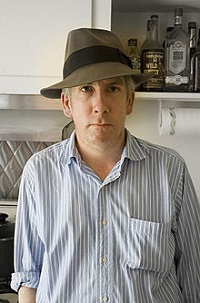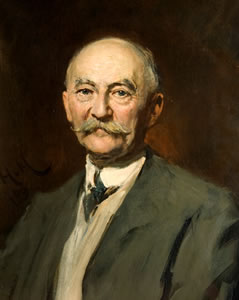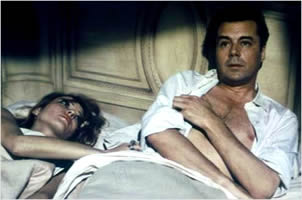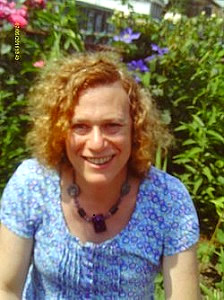De Amerikaanse schrijver Jim Knipfel werd geboren op 2 juni 1965 in Green Bay, Wisconsin. Zie ook alle tags voor Jim Knipfel op dit blog.
Uit: Slackjaw: A Memoir
“There, you see? Can you imagine how they would feel if you killed yourself?”
“So, what, I should go on living solely out of guilt? Guilt overhow they would feel if I were to end it? That’s not much to workwith.” I chuckled.
“See? You just laughed! If you laugh, that must meansomething. Everything’s not completely dark.”
“Well, Wagner said,” I responded, one more young man whotook his Wagner too seriously, “`Amidst laughter should we faceour doom.'”
“Who?”
“Never mind,” I told her, knowing the whole thing was amistake. It wasn’t going anywhere, and never would go anywhere.”Thanks for taking the time, but I’m suddenly real tired. I’mgoing to bed.”
“Are you still thinking about hurting yourself?”
“Well, yeah. But right now I’m just too damn tired.” Thesefew minutes on the phone with her had completely sapped whatenergy I had left. She began to say something else, but I hungup. Useless. I lay down on my mattress, still dressed, and fellasleep.
The next morning was brisk and clear outside. Therewere things I was supposed to be doing, but for the life of me, Icouldn’t remember what. I put on my hat and coat, left theapartment, and started walking in a direction I’d never gone. I hadstarted wearing a black fedora everywhere when I was sixteenyears old. At the time, I thought it made me look like Bogart. Iwas mistaken. So many of us go through life trying to be Bogartor Cagney, but we mostly end up like Elisha Cook, Jr. I certainlydid. But the hat stayed. It was my most identifiable feature.
I walked for hours, hoping I could exhaust myself and walkthe bad thoughts out of my head. Once my legs started gettingnumb, I turned around and started back home. While I walked,I took inventory, only to discover that there was nothing to count.
When I got home, I opened the door, threw my hat and coaton the mattress, snatched the razors off the desk, took them into the bathroom, and searched in vain for a comfortable spot on the tiled floor. After a few minutes I gave up on that silly notion and set to work on the right wrist.”

Jim Knipfel (Green Bay, 2 juni 1965)
De Duitse schrijver en literatuurcriticus Marcel Reich-Ranicki werd geboren op 2 juni 1920 in Włocławek, Polen. Zie ook alle tags voor Marcel Reich-Ranicki op dit blog.
Uit: Deutschlands Glück in Deutschlands Unglück
„Aber es scheint so, als sei er zu dem Ergebnis gekommen, daß es leichtsinnig wäre, den postumen Revisionsprozeß, der auch ihm nicht erspart bleiben konnte, anderen, möglicherweise nicht zuständigen Kommentatoren zu überlassen. Vielmehr sei es richtiger, sich der Sache beizeiten, wenigstens teilweise anzunehmen.
Die Edition der ab 1977 in zehn Bänden erscheinenden Tagebücher Thomas Manns war 1986 abgeschlossen. Nun bietet ein Tagebuch in der Regel monologische Prosa ohne künstlerischen Anspruch, es ist eine zuchtlose, häufig unkontrollierte und daher für den Autor sehr bequeme Aneinanderreihung von Gedanken und Gefühlen, Beobachtungen und Beschreibungen. Was es immerhin ermöglicht, ist Unmittelbarkeit und Subjektivität. Beides mutet freilich oft etwas dilettantenhaft an.
Auch Thomas Manns Tagebücher haben im Grunde keinen literarischen Wert. Dennoch wurden sie sofort als ungewöhnliche Dokumente anerkannt, von seinen Anhängern und Bewunderern ebenso wie von jenen, die den Autor ablehnten und verachteten. Der Hauptbestandteil der Tagebücher sind Eintragungen über den Alltag. Thomas Mann geht spazieren und schreibt in Klammern “ohne Weste”, er trinkt Lindenblütentee “mit einer Zitronenscheibe”, er ißt zum Frühstück “zwei Eier ohne das Weiße des einen”, er notiert “mit dem Pudel gescherzt”. Und dergleichen mehr. Ich frage mich, warum ich trotz dieser nicht zu überbietenden Belanglosigkeiten die Lektüre des Tagebuchs keineswegs abgebrochen habe. Weil es aus der Feder des Autors stammt, der den “Zauberberg”, den “Josephsroman” verfaßt hat? Nein, das ist es nicht – und auch nicht die Tatsache, daß sich hier zwischendurch aufschlußreiche und auch originelle Eintragungen finden.“

Marcel Reich-Ranicki (2 juni 1920 – 18 september 2013)
De Duitse schrijfster Sibylle Berg werd geboren in Weimar op 2 juni 1962. Zie ook alle tags voor Sibylle Berg op dit blog.
Uit: Hauptsache weit
“Und weg, hatte er gedacht.
Die Schule war zu Ende, das Leben noch nicht, hatte noch nicht begonnen, das Leben. Er hatte nicht viel Angst davor, weil er noch keine Enttäuschungen kannte. Er war ein schöner Junge mit langen dunklen Haaren, er spielte Gitarre, komponierte am Computer und dachte, irgendwie werde ich wohl später nach London gehen, was Kreatives machen. Aber das war später.
Und nun?
Warum kommt der Spaß nicht? Der Junge hockt in einem Zimmer, das Zimmer ist grün, wegen der Neonleuchte, es hat kein Fenster und der Ventilator ist sehr laut. Schatten huschen über den Betonboden, das Glück ist das nicht, eine Wolldecke auf dem Bett, auf der schon einige Kriege ausgetragen wurden. Magen gegen Tom Yam, Darm gegen Curry. Immer verloren, die Eingeweide.
Der Junge ist 18, und jetzt aber Asien, hatte er sich gedacht. Mit 1000 Dollar durch Thailand, Indien, Kambodscha, drei Monate unterwegs, und dann wieder heim, nach Deutschland. Das ist so eng, so langweilig, jetzt was erleben und vielleicht nie wieder zurück. Hast du keine Angst, hatten blasse Freunde zu Hause gefragt, so ganz alleine? Nein, hatte er geantwortet, man lernt ja so viele Leute kennen unterwegs. Bis jetzt hatte er hauptsächlich Mädchen kennen gelernt, nett waren die schon, wenn man Leute mag, die einen bei jedem Satz anfassen. Mädchen, die aussahen wie dreißig und doch so alt waren wie er, seit Monaten unterwegs, die Mädchen, da werden sie komisch. Übermorgen würde er in Laos sein, da mag er jetzt gar nicht dran denken, in seinem hässlichen Pensionszimmer, muss Obacht geben, dass er sich nicht aufs Bett wirft und weint, auf die Decke, wo schon die anderen Dinge drauf sind. In dem kleinen Fernseher kommen nur Leute vor, die ihm völlig fremd sind, das ist das Zeichen, dass man einsam ist, wenn man die Fernsehstars eines Landesnicht kennt und die eigenen keine Bedeutung haben. Der Junge sehnt sich nach Stefan Raab, nach Harald Schmidt. Er merkt weiter, dass er gar nicht existiert, wenn er nichts hat, was er kennt. Wenn er keine Zeitung in seiner Sprache kaufen kann, keine Klatschgeschichten über einheimische Prominente lesen, wenn keiner anruft und fragt, wie es ihm geht. Dann gibt es ihn nicht.“

Sibylle Berg (Weimar, 2 juni 1962)
De Canadese schrijfster Carol Shields werd op 2 juni 1935 in Oak Park, Chicago, geboren als Carol Warner. Zie ook alle tags voor Carol Shields op dit blog.
Uit: The Republic of Love
“If Fay McLeod no longer loves Peter Knightly, there is still the question of whether she can live without him, live alone that is. She is thirty-five years old, after all, and should know something about compromise.
Toast, she says to herself, might be the test.
She is being whimsical, of course, which is one of the ways she protects herself, but she is partly
serious too: can she bear to stand alone in her kitchen on a Saturday morning, or any morning, for that matter, and push down the lever of her ten-year-old General Electric black-and-chrome toaster and produce a single slice of breakfast toast? One only.
Other things she can do on her own. Traveling, for instance. Last summer, tracking down mermaid
legends, she scoured half a dozen American libraries, California, Texas, Boston — three happy weeks, traveling light, one suitcase, three changes of clothes, two pairs of shoes, that was it. She relished the ease of arranging single-seat tickets and the sight every night of a neatly made-up hotel room, avoiding, if she could, those pompous doubles with their giant puffed duvets and bulging headboards.
“A very small room, please,” she said to a succession of hotel clerks, interchangeable behind their
crisp summer haircuts and narrow shirt collars and eager looks, and they’d complied, beaming as
though she’d bent forward over the desk and smoothed their faces with the flat of her hand.
Occasionally, vacationing families with young children called out greetings, but mostly she sat alone
by pool sides or in hotel dining rooms with a book open by her plate. People looked her way and
smiled, pitying or else envious, she wasn’t sure which, and it didn’t matter. She finds the bewilderment of travel rousing. Next summer she’ll be off again, Europe this time, her mermaids again, a second research grant, more generous than the first. She departs at the end of July and will be gone for four intense weeks. Most of the arrangements have already been made – and the thought that she will be on her own adds to, rather than subtracts from, her anticipation.”

Carol Shields (2 juni 1935 – 16 juli 2003)
Scene uit de gelijknamige film met Bruce Greenwood (Tom) en Emilia Fox (Fay), 2003
De Nederlandse sportjournalist en schrijver Jean Nelissen werd geboren in Geleen op 2 juni 1936. Zie ook alle tags voor Jean Nelissen op dit blog.
Uit: Het intrigerende wielerleven van Jean Nelissen
“Toon en Rietje Hermans hebben een huis gekocht in de chique Stokstraat in het hart van de totaal gerenoveerde. voormalige hoerenbuurt van Maastricht. Een paar keer per week ga ik bij Toon ontbijten, want ik werk op driehonderd meter afstandbij dagblad De Limburger in de Havenstraat. Wij kennen elkaar goed. Gedurende meer dan twintig jaar sluiten Toon‚ Rietje, de Zangeres zonder Naam’ Mary Servaes en haar man Sjo en ik om twee uur ’s nachts af aan de stamtafel van de populaire kroeg ‘ln den Ouden Vogelstruys’ aan het Vrijthof. Op zondagmiddag drinken we koffie in de bestuurskamer van voetbalclub MVV.
In 1965 volg ik met Toon in mijn tweepersoons sportwagen. een knalrode Triumph met een stoffen zwart dakje, de Ronde van Nederland. Op weg naar Simpelveld – in de Koninginnerit – zien we een prachtig duel tussen jan Janssen en Jacques Anquetil. Het is 32 graden en ik zeg tegen Toon: ‘Zullen we iets drinken?’ We stappen een café binnen en zodra de mensen in de overvolle kroeg Toon zien roepen ze: ‘Toon. vertel een mop.‘ Dat is het leven dat hem achtervolgt. Als hij met zijn one-man-show op de televisie verschijnt. is het land uitgestorven en zijn de autowegen verlaten.Want het volk zit massaal voor de tv, hij haalt 94% kijkdichtheid!”

Jean Nelissen (2 juni 1936 – 1 september 2010)
Monument voor Jean Nelissen op de Gulperberg
De Engels romanschrijver en dichter Thomas Hardy werd op 2 juni 1840 geboren in Higher Bockhampton, bij Dorchester. Zie ook alle tags voor Thomas Hardy op dit blog
“I Said To Love”
I said to Love,
“It is not now as in old days
When men adored thee and thy ways
All else above;
Named thee the Boy, the Bright, the One
Who spread a heaven beneath the sun,”
I said to Love.
I said to him,
“We now know more of thee than then;
We were but weak in judgment when,
With hearts abrim,
We clamoured thee that thou would’st please
Inflict on us thine agonies,”
I said to him.
I said to Love,
“Thou art not young, thou art not fair,
No faery darts, no cherub air,
Nor swan, nor dove
Are thine; but features pitiless,
And iron daggers of distress,”
I said to Love.
“Depart then, Love! . . .
– Man’s race shall end, dost threaten thou?
The age to come the man of now
Know nothing of? –
We fear not such a threat from thee;
We are too old in apathy!
Mankind shall cease.–So let it be,”
I said to Love.

Thomas Hardy (2 juni 1840 – 11 januari 1928)
Portret door Hubert Herkomer. 1909
De Franse schrijver Donatien Alphonse François, Markies de Sade werd geboren op 2 juni 1740 in Parijs. Zie ook alle tags voor Markies de Sade op dit blog.
Uit: Justine (Vertaald door Austryn Wainhouse)
“Why,” he continued with a curse, “he doesn’t much aid you, your God, does he? and thus he allows unhappy virtue to suffer, he abandons it to villainy’s hands; ah! what a bloody fine God you’ve got there, Therese, what a superb God he is! Come,” he says, “come here, whore, your prayer should be done,” and at the same time he places me upon the divan at the back of that cell; “I told you Therese, you have got to die!”
He seizes my arms, binds them to my side, then he slips a black silken noose about my neck; he holds both ends of the cord and, by tightening, he can strangle and dispatch me to the other world ei quickly or slowly, depending upon his pleasure.
“This torture is sweeter than you may imagine, Therese,” says Roland; “you will only approach death by way of unspeakably pleasurable sensations; the pressure this noose will bring to bear upon your nervous system will set fire to the organs of voluptuousness; the effect is certain; were all the people who are condemned to this torture to know in what an intoxication of joy it makes one die, less terrified by this retribution for their crimes, they would commit them more often and with much greater self-assurance; this delicious operation, Therese, by causing, as well, the contraction of the locale in which I am going to fit myself,” he added as he presented himself to a criminal avenue so worthy of such a villain, “is also going to double my pleasure.”

Markies De Sade (2 juni 1740 – 2 december 1814)
Anna Karina en Dirk Bogardein de Duits-Italiaanse film „Justine“ uit 1969
Onafhankelijk van geboortdata
De Amerikaanse dichteres, schrijfster en hoogleraar transgender-wetenschappen Joy Ladin werd geboren in Rochester, New York in 1961. Zie ook alle tags voor Joy Ladin op dit blog.
Lost and Found
You find yourself quite comfortable
in the bony clothes of death,
though you seem to have lost the feeling of,
well, feeling. Light moves through you
easily and eerily, as though life were a window
that was broken when you found it
so you can admire without shame
its fracture-stars
that never set, though you find you get a little lost
when you try to navigate by them
though the complicated waste
of loss and obligation
to the life that reveals itself
when you close your eyes,
the stars, that is, of the foundling self,
aroused and assertive, warmed by the hope
you found you’ve lost
in the bony clothes of death.

Joy Ladin (Rochester, 1961)
Zie voor nog meer schrijvers van de 2e juni ook mijn blog van 2 juni 2013 deel 2.
